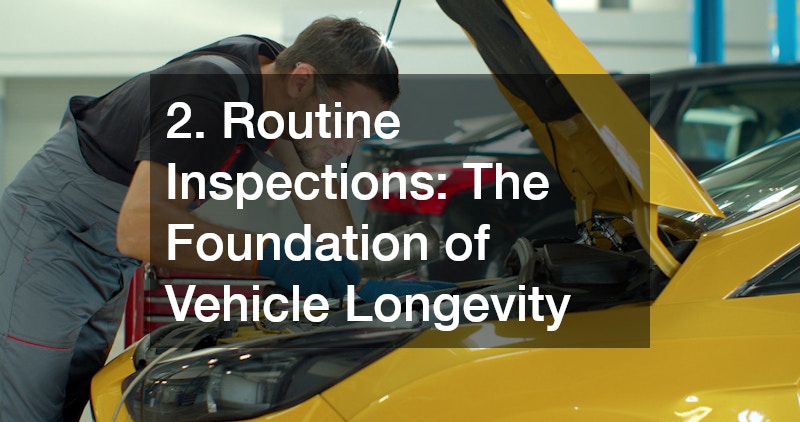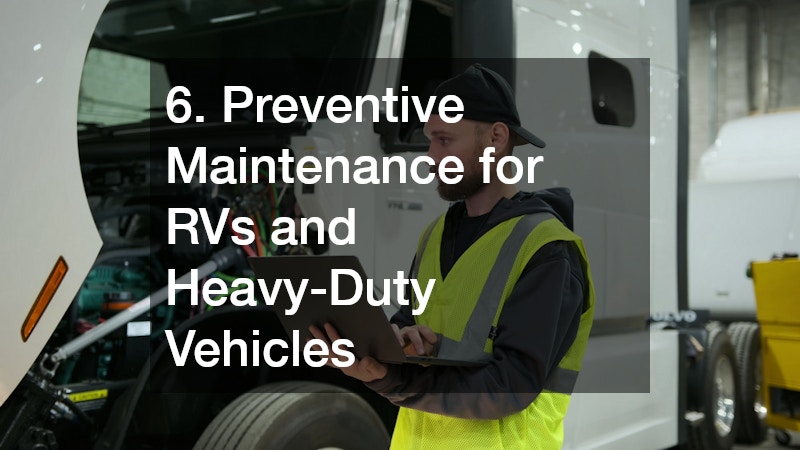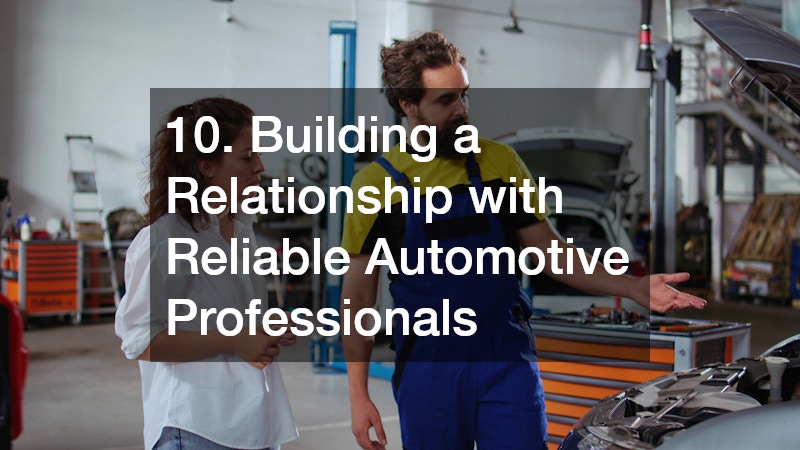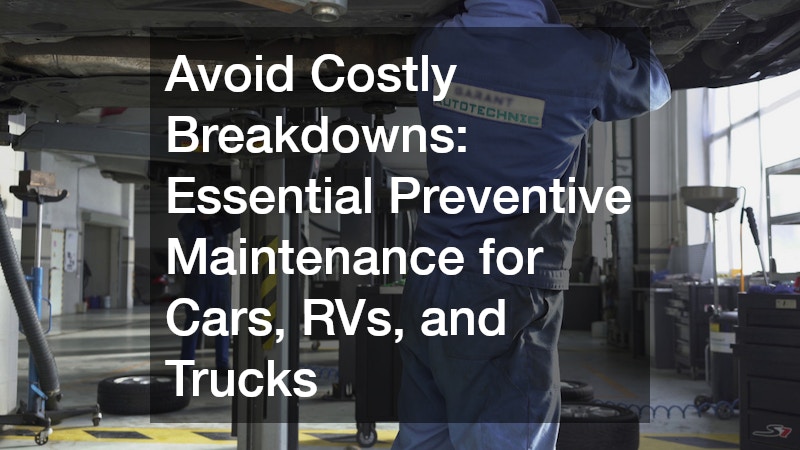No one wants to deal with a sudden car breakdown on the side of a busy highway. Yet, this scenario is all too common for drivers who overlook regular vehicle care. Preventive maintenance is the key to avoiding costly repairs, extending the lifespan of your car, and ensuring safety for you and your passengers. Whether you drive a compact sedan, a family SUV, an RV, or a heavy-duty truck, every vehicle needs timely inspection and servicing.
Modern vehicles are sophisticated machines made up of intricate systems that rely on one another. When one component fails, it can trigger a chain reaction leading to expensive damage. By prioritizing preventive care, you not only save money but also maintain your car’s optimal performance year-round. Let’s explore how regular maintenance keeps cars, RVs, and trucks running smoothly and how investing a little time today can prevent major repair bills tomorrow.
1. Understanding Preventive Maintenance and Its Benefits
Preventive maintenance refers to the regular inspection and servicing of your vehicle before a breakdown occurs. Unlike reactive repairs—where you fix something only after it breaks—preventive maintenance is proactive. It’s about identifying and resolving small issues before they escalate.
The benefits go far beyond saving money. Routine care improves fuel efficiency, reduces emissions, enhances safety, and increases your car’s resale value. For instance, used car services often rely on maintenance records to determine a vehicle’s worth. A well-maintained car typically commands a higher price in the resale market because it reflects responsible ownership.
In addition, preventive care helps identify hidden problems that can go unnoticed during daily driving. Even auto body shops, which primarily handle collision repair, can spot corrosion or structural issues when performing inspections. Addressing these early can prevent costly repairs later on. The ultimate goal of preventive maintenance is to ensure your vehicle stays reliable, safe, and ready for the road at all times.
2. Routine Inspections: The Foundation of Vehicle Longevity

Regular inspections form the backbone of preventive maintenance. A well-structured inspection routine helps identify potential problems early, allowing you to address them before they cause major damage. Here are key areas that require regular checks:
-
Engine oil and fluids: Check and change engine oil at recommended intervals. Fresh oil reduces friction and protects engine components from wear.
-
Brakes and suspension: Inspect brake pads, rotors, and fluid regularly to prevent accidents.
-
Tires and alignment: Uneven wear can indicate alignment issues, while underinflated tires reduce fuel efficiency.
-
Battery and electrical systems: Test your battery, lights, and alternator to avoid electrical failures.
Your local tire dealers can play an important role here. They can inspect tread wear, ensure proper inflation, and help you select the right tires for your driving conditions. Proper tire care not only improves safety but also enhances fuel economy.
When purchasing a pre-owned car, used car services typically offer comprehensive multi-point inspections to verify that the vehicle is in good condition. These checks provide peace of mind and reduce the likelihood of unexpected repairs shortly after purchase.
Routine inspections are your first line of defense against unexpected breakdowns. Think of them as regular health checkups for your car—an essential step toward long-term performance and safety.
3. Engine and Transmission Care: Protecting the Heart of Your Vehicle
The engine and transmission are the most vital—and expensive—components of any vehicle. Neglecting their maintenance can lead to catastrophic failures that cost thousands to repair.
Start with regular oil and filter changes. Clean oil reduces internal friction and keeps the engine running smoothly. Pay attention to unusual noises, excessive smoke, or dashboard warning lights—these often signal underlying issues.
For owners of diesel-powered trucks or RVs, a certified diesel mechanic is essential. Diesel engines require specialized attention, particularly when it comes to fuel injectors, turbochargers, and exhaust systems. Regular servicing ensures these complex systems operate efficiently, preventing fuel wastage and loss of power.
Transmission care is equally important. The transmission is responsible for transferring power from the engine to the wheels, and neglecting it can lead to costly repairs. A transmission mechanic shop can perform fluid checks, detect leaks, and spot early signs of slipping gears or delayed shifts. Preventive measures like fluid replacement, avoiding overloading, and checking the cooling system all contribute to longer transmission life.
Engine and transmission maintenance might not seem urgent when your car is running fine, but ignoring small signs of trouble is one of the quickest ways to end up stranded—and facing an expensive repair bill.
4. Tire and Brake Maintenance: Ensuring Safety on Every Drive

Tires and brakes are your vehicle’s most critical safety components. They determine how well your vehicle grips the road, stops in emergencies, and handles adverse weather conditions. Regular maintenance of these systems not only enhances safety but also saves money by preventing premature wear.
-
Tire Care:
-
Rotate tires every 5,000–7,000 miles to promote even wear.
-
Keep tires properly inflated according to manufacturer recommendations.
-
Replace tires when the tread depth falls below safe limits.
-
Your neighborhood local tire dealers can offer professional assessments and guide you in choosing tires that suit your driving habits and climate. Properly maintained tires improve fuel efficiency and driving comfort.
-
Brake Care:
-
Listen for squealing or grinding noises—they often signal worn brake pads.
-
Have your brake fluid checked annually.
-
Avoid sudden braking when possible to extend brake life.
-
Even a small delay in brake servicing can result in reduced stopping power, which can be dangerous. For added safety, schedule brake inspections during routine maintenance appointments.
Good tires and reliable brakes are the foundation of a safe and responsive vehicle. By maintaining them, you’re ensuring that your car can handle sudden stops, sharp turns, and emergency maneuvers with confidence.
5. Keeping Your Cool: Addressing Car AC and Cooling System Problems Early
Few things are more uncomfortable than driving in sweltering heat with a broken air conditioner. Yet, car AC problems can indicate deeper mechanical issues. A malfunctioning AC might be caused by a refrigerant leak, a clogged condenser, or a faulty compressor—all of which can strain your vehicle’s electrical and cooling systems.
To avoid these issues, make AC checks a part of your regular maintenance routine:
-
Run your AC periodically—even in winter—to keep seals lubricated.
-
Replace the cabin air filter every 12,000–15,000 miles to ensure clean airflow.
-
Check the refrigerant level and ensure there are no leaks.
A Honda repair shop or specialized AC technician can accurately diagnose air-conditioning issues and restore system efficiency. Ignoring early warning signs such as weak airflow or strange odors can lead to more severe problems down the road.
Your engine’s cooling system also deserves attention. Overheating is one of the most common causes of engine failure. Regularly check the coolant level, inspect hoses for cracks, and flush the system as recommended. Preventive AC and cooling maintenance keeps your car running comfortably and reliably, no matter the season.
6. Preventive Maintenance for RVs and Heavy-Duty Vehicles

RVs and heavy-duty trucks have unique maintenance needs due to their size, complexity, and the demands of long-distance travel. Neglecting care can lead to breakdowns far from help—an inconvenience that can quickly become expensive.
RV repair services specialize in maintaining not just the engine and transmission, but also the living systems inside your motorhome. Regular inspections should include:
-
Electrical and plumbing systems
-
Roof and seal integrity
-
Generator performance
-
Tire pressure and alignment
Before embarking on long trips, have your engine and transmission inspected. A professional diesel mechanic can check for signs of wear, oil leaks, or component failures that could ruin your journey.
Routine servicing prevents inconvenient roadside problems and ensures that your RV remains a safe and comfortable home on wheels. With the right care, you’ll enjoy countless miles of worry-free travel and extend your vehicle’s lifespan dramatically.
7. What to Do When Problems Arise: Professional Help and Emergency Solutions
Even with meticulous maintenance, unexpected issues can occur. Knowing what to do when that happens can make all the difference.
If your car breaks down, stay calm and pull over safely. Call for assistance rather than attempting major repairs on your own. Professional tow trucks are equipped to safely transport your vehicle without causing additional damage.
After an accident or collision, visiting reputable auto body shops ensures your vehicle is restored to its original condition. Skilled technicians can realign frames, repaint surfaces, and perform dent repairs that make your vehicle look new again. These services not only maintain aesthetics but also preserve structural integrity and resale value.
For mechanical issues, always consult professionals. A certified mechanic can diagnose the root cause accurately, saving you time and money compared to trial-and-error fixes. Timely professional attention prevents small issues from escalating into major breakdowns—a key aspect of any effective maintenance plan.
8. Seasonal Maintenance Tips for Year-Round Reliability
Each season brings different challenges for your vehicle. Adapting your maintenance routine to the time of year helps ensure your car or truck remains dependable under varying conditions.
-
Spring:
-
Replace wiper blades and check for corrosion from winter salt.
-
Inspect belts, hoses, and fluid levels.
-
-
Summer:
-
Pay special attention to car AC problems and overheating risks.
-
Ensure proper tire inflation to handle hot pavement conditions.
-
-
Fall:
-
Check brakes, lights, and wipers before rainy weather sets in.
-
Clean the battery terminals to prevent electrical problems.
-
-
Winter:
-
Test antifreeze levels to avoid freezing.
-
Keep emergency supplies like jumper cables, blankets, and tire chains in your vehicle.
-
Ensure that your heater and defroster are working properly.
-
For RV owners, winterizing the vehicle before storage is crucial. Drain water tanks, protect the plumbing system, and seal openings to prevent moisture damage. Seasonal maintenance isn’t just about comfort—it’s about ensuring safety and reliability in every climate.
9. Cost Comparison: Preventive Maintenance vs. Major Repairs
Many vehicle owners postpone maintenance because they want to save money. Ironically, neglecting small maintenance tasks often leads to much higher repair costs later.
Here’s a quick cost comparison to illustrate the difference:
-
Regular oil change: $60–$100 vs. Engine overhaul: $3,000+
-
Tire rotation and balancing: $40–$80 vs. Tire blowout replacement: $400–$800
-
Transmission fluid service: $150–$200 vs. Transmission rebuild: $2,500+
When you look at the numbers, it’s easy to see why preventive maintenance is the smarter investment. A visit to a transmission mechanic shop for fluid service or inspection can save you thousands compared to replacing an entire transmission.
Even body maintenance matters. A small dent or scratch left unrepaired can lead to rust and corrosion over time. Visiting auto body shops for timely touch-ups is much cheaper than extensive body restoration later. Preventive care pays off not only in cost savings but also in peace of mind, knowing your vehicle is always road-ready.
10. Building a Relationship with Reliable Automotive Professionals

One of the best long-term strategies for maintaining your vehicle is building a strong relationship with trusted automotive experts. When your mechanic knows your car’s service history, they can offer personalized advice and detect patterns that may indicate potential issues.
Here’s how to find reliable professionals:
-
Look for certifications: Choose ASE-certified technicians with proven expertise.
-
Check reviews: Online ratings and word-of-mouth recommendations can reveal a shop’s reputation.
-
Ask about warranties: A shop that stands behind its work demonstrates confidence in its service quality.
Whether you drive a family car, truck, or RV, consistency matters. Sticking with one trusted Honda repair shop, local tire dealers, or RV repair services ensures that your vehicle receives the right care every time.
Keeping detailed service records also helps you track the maintenance needed at future intervals. Plus, when it’s time to sell your vehicle, these records demonstrate responsible ownership and can significantly increase its resale value.
Conclusion: Invest in Preventive Care to Save Time, Money, and Stress
Preventive maintenance is not just an optional expense—it’s a necessary investment in your vehicle’s future. Every oil change, tire rotation, and inspection you perform adds years to your car’s life and saves you from the financial burden of major repairs.
From engine and transmission servicing to seasonal checkups, every small step you take toward vehicle care pays off in long-term reliability. Whether it’s consulting a diesel mechanic for your truck, working with auto body shops for post-collision care, or scheduling AC maintenance to prevent car AC problems, proactive care keeps you ahead of potential issues.
The key to avoiding costly breakdowns lies in consistency and awareness. Keep an eye on your vehicle’s condition, listen for unusual sounds, and address problems early. Partnering with reliable professionals—from local tire dealers to RV repair services—ensures that every component of your car, truck, or RV stays in top shape.
In the end, preventive maintenance is more than a routine—it’s peace of mind. So, take charge of your vehicle’s health today, and drive confidently knowing that your car is ready for the road ahead.

